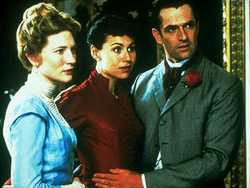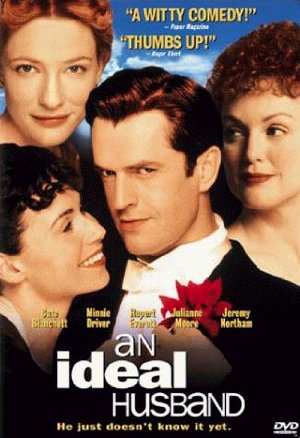An Ideal Husband Review
By James Brundage

The Victorians were well known for keeping a stiff upper lip about everything, and their romance was absolutely no exception. Their entire world was constructed around subtlety, and, in tune with that, the one word that can be used to describe An Ideal Husband is subtle.
The humor is subtle. The romance is subtle. The very evil Laura Cheveley (Julianne Moore) is less subtle, but still subtle. The plot is subtle. The movie is so subtle that anyone who hasn't already acclimated themselves to British-style filmmaking (that is, incredibly subtle) or adapted themselves to Oscar Wilde (witty, but still subtle), will probably turn the movie off about fifteen minutes in after it fails to capture their interest.
If, like me, you have the misfortune of being part British, then subtlety will be ingrained into your blood and picking up the humor in An Ideal Husband will not be hard at all. Then again, if you're like me, you can actually enjoy reading Shakespeare instead of watching Kenneth Branaugh.
An Ideal Husband is the story of a seemingly squeaky-clean politician in the House of Commons, Robert Chiltern (Jeremy Northam). Chiltern, by Victorian era-British standards, has it all. He has a wife (Cate Blanchett) who adores him, a very large amount of money, and a seemingly unstoppable political career.
At a party to celebrate being British, being Chiltern, and having it all, he runs into widow Laura Cheveley. Cheveley is an entrepreneur: she has invested heavily in an Argentinean canal and will stop at nothing to ensure that Parliament supports it. Due to a mutual and deceased acquaintance, she has come into possession of a letter that will blackmail Chiltern into vociferously expressing his false support of the scheme.
Chiltern must go back and forth on whether or not to meet her demands, and in the process enlist the help of the quick-witted eligible bachelor Arthur Goring (Rupert Everett).
Goring is a bachelor to the bone, who makes British women swoon as much as their corsets will allow. Among those swooning is Chiltern's sister, Mabel (Minnie Driver). His main trouble is deciding which party to go to and dealing with his father's (John Wood) constant pressure to marry.
If you are paying any attention to this film, can understand it past British dialogue and subtlety, and know Oscar Wilde, you will know right off that this was one of Wilde's many attempts to show his distaste for heterosexual relationships and the Victorian nobility. Wilde shines (as much as Wilde ever can shine) through in writer-director Oliver Parker's adaptation of Oscar Wilde's play.
Oscar Wilde was inherently witty, a homosexual who reveled in passing British-style insults to heterosexual hypocrisy, and eternally poking fun at the British upper crust (albeit often from the inside). An Ideal Husband should take pride in being one of the few of the 45 Wilde adaptations to date to actually capture the essence of Oscar Wilde's work.
Goring is an obvious foil for Wilde himself, and a chance for Wilde to pass off enormous insult to the Victorian system. Seeing as Goring is Wilde is a very good degree, and Everett is not only openly gay but also a noted Wilde fan, Everett's portrayal is smack on-target. Also on target is Julianne Moore, who plays Cheveley with such a delightful evil that her malicious playfulness always ends up right in the forefront. The two of them steal the show.
The sad thing about An Ideal Husband is not these performances, however, but how Wilde's own work falters towards the end. As we get towards the end of the movie, Wilde's characters double in on themselves. The ultra-honest wife lies. The malicious villain turns out only to be looking for love. The bachelor is eventually married. Although these are trademarks of Wilde's approach to showing how hypocritical the Victorian era was, they weaken the film. When Cheveley is revealed to be searching for affection, we do not pity her, we lament that she was not the pure evil that she was originally painted to be. When Goring walks down the aisle, he has ceased to become a fun character and ended up being reigned in.
These faults might have just weakened a regular film, but when the film depends on having taste for British humor as is, these faults represent a final blow. The film was average, and these mistakes made it sub par. Better luck next time, Oscar... I'm waiting for a new version of The Picture of Dorian Gray.
Everett compresses Driver's stomach.

Facts and Figures
Year: 1999
Run time: 97 mins
In Theaters: Friday 18th June 1999
Box Office Worldwide: $18.5M
Budget: $14M
Distributed by: Miramax Films
Production compaines: Miramax Films, Pyramide Productions
Reviews
Contactmusic.com: 2.5 / 5
Rotten Tomatoes: 85%
Fresh: 55 Rotten: 10
IMDB: 6.9 / 10
Cast & Crew
Director: Oliver Parker
Producer: Bruce Davey, Uri Fruchtmann, Barnaby Thompson
Screenwriter: Oliver Parker
Starring: Cate Blanchett as Lady Gertrude Chiltern, Minnie Driver as Miss Mabel Chiltern, Rupert Everett as Lord Arthur Goring, Julianne Moore as Mrs. Laura Cheveley, Jeremy Northam as Sir Robert Chiltern, Peter Vaughan as Phipps
Also starring: John Wood, Lindsay Duncan, Bruce Davey, Uri Fruchtmann, Barnaby Thompson, Oliver Parker














